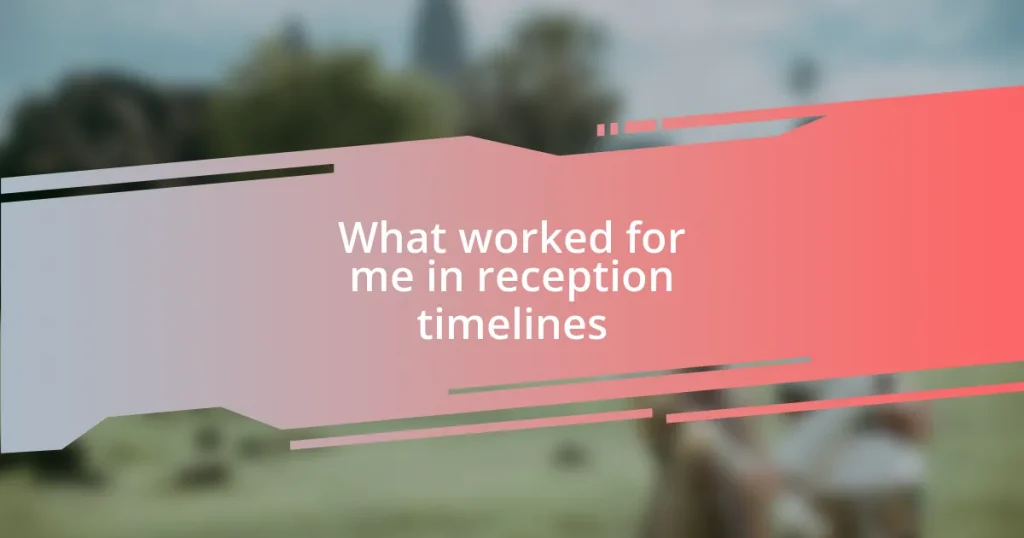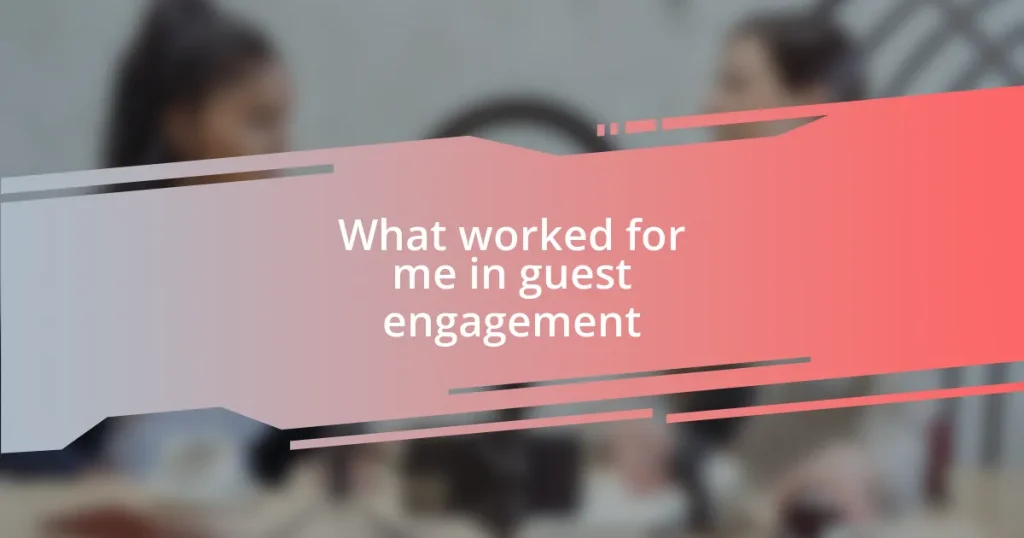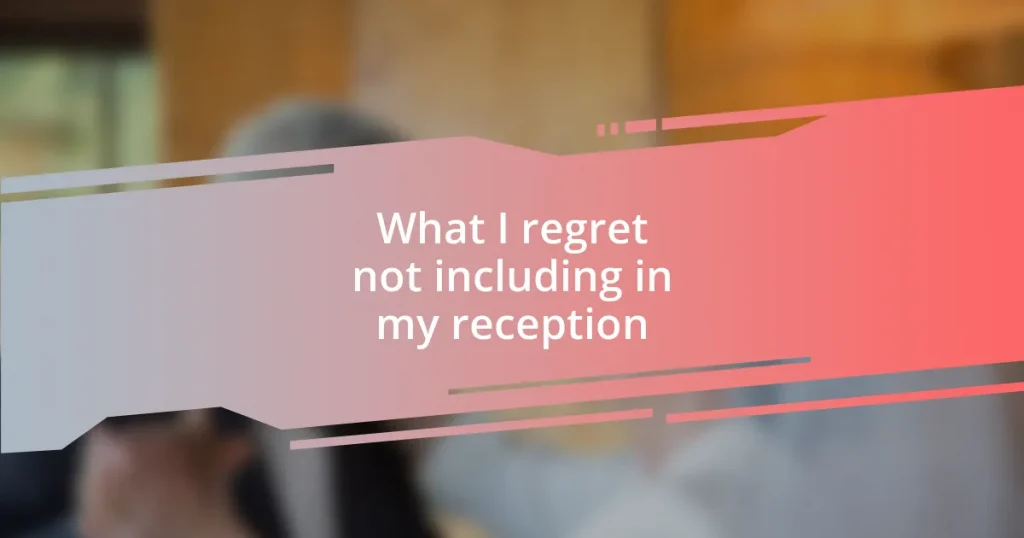Key takeaways:
- Choosing a venue involves balancing aesthetics with practical considerations such as budget, capacity, and accessibility.
- Identifying event requirements—like guest capacity and amenities—is crucial for ensuring a successful event experience.
- Comparing venues should include evaluating layout, flexibility, and gathering feedback from previous users to avoid potential issues.
- Final venue decisions should prioritize ambiance and align with financial realities for a meaningful event experience.

Understanding venue selection process
When I first embarked on choosing a venue, I discovered that it’s not just about picking a pretty space; it’s a nuanced process. Have you ever thought about how the venue sets the entire tone for your event? I realized early on that the atmosphere—be it intimate, grand, or casual—shapes the experience for your guests.
As I browsed through countless options, I often found myself getting caught up in the aesthetics. However, I soon recognized the importance of practical considerations like location, accessibility, and capacity. I remember walking into one venue, feeling an immediate connection, but then I noticed the parking situation was a nightmare. How crucial is it, really, for your guests to have a stress-free arrival?
Budget constraints also played a significant role in my decision-making process. I learned that staying within budget doesn’t mean sacrificing quality—it’s about making informed choices. Can you recall a time when you felt overwhelmed by choices? I sure can. It was those moments that taught me the value of prioritizing what truly matters for the event’s success.

Identifying your event requirements
Identifying event requirements is a crucial step that shapes the entire planning process. I remember a time when I wanted a cozy gathering for my friend’s milestone birthday. That experience taught me the significance of understanding the expected number of guests. Too often, planners overlook this detail, only to be left scrambling when the venue can’t accommodate their vision. It’s that moment of realization that highlights how essential it is to clearly identify your guest list.
Another aspect I found vital in my journey was the purpose of the event. Once, I planned a corporate workshop and assumed any clean space would do. However, I learned that the venue needs to support the event’s theme and goals. For instance, a lively and engaging environment often enhances creativity, while a more subdued space might be perfect for serious discussions. Assess your event’s requirements carefully—the venue can either foster collaboration or stifle it, affecting the overall outcome significantly.
It’s also worth considering the amenities that come with a venue. I’ve encountered venues that offered state-of-the-art tech equipment, but I was also drawn to one that had an in-house catering team—which turned out to be a huge plus. Each venue has its unique strengths; ensuring that the essential services are available can ultimately save stress on the day of the event. It’s that careful balancing act between features and functionality that can make or break your event planning experience.
| Event Requirement | Details |
|---|---|
| Guest Capacity | Understanding the expected number of attendees helps in selecting the right venue. |
| Event Purpose | The venue should align with the event’s theme to enhance the experience. |
| Amenities | Features like catering and tech support can simplify planning and execution. |

Budgeting for the perfect venue
When it comes to budgeting for the perfect venue, I found it’s essential to strike a balance between aspiration and reality. I remember the excitement of envisioning the dream location, only to face the stark truth of my finances. Creating a detailed budget helped me remain grounded amid those dreamy possibilities. I recommend breaking down costs into specific categories, giving you clarity on what you can afford without overlooking important details like hidden fees or deposits that can catch you off guard later.
Here’s a quick list to guide you on what to consider in your venue budget:
- Venue Rental Fee: The primary cost; be sure to understand what this fee includes.
- Catering Costs: Whether packaged or charged per person, food costs can escalate quickly.
- Decoration: Factor in the cost of any needed decor that aligns with your vision for the event.
- Accessibility Fees: If the venue requires special transportation or access, it’s important to account for these.
- Insurance and Permits: Sometimes overlooked, these can add to your final total but are crucial for protecting your investment.
Reflecting on my experience, I learned to prioritize essentials and allow a buffer for unexpected expenses. There’s something empowering about sticking to a plan, even when tempting venues try to sway you. Each time I adjusted my budget, I felt more in control, leading to choices that truly reflected both my dreams and my financial reality.

Evaluating venue locations and accessibility
Evaluating venue locations is all about convenience and access. I once found myself in a beautiful venue that was perfect for my event, but I’ve often thought about how frustrating it was for my guests to navigate through a maze of streets just to get there. It’s not just about how lovely a place looks; knowing the proximity to major transport links can make a significant difference in guest satisfaction. What’s the point of a stunning space if no one enjoys the journey there?
Accessibility shouldn’t be an afterthought—it needs to be a priority. I remember attending a wedding that, while gorgeous, had limited parking options, which left many guests feeling stressed. As a planner, thinking ahead about guest accessibility not only helps you avoid hiccups but also shows that you truly care about their experience. Think of options like ramps for those with mobility issues or even public transport accessibility; these considerations can elevate your event to a whole new level.
In my experience, I’ve learned to visit venues at different times of the day to get a feel for the surrounding traffic and parking situation. During a site visit for a corporate event, I found out that midday traffic could turn a simple commute into a significant delay. I couldn’t help but ask myself, “How will this affect my team’s focus if they’re stressed out just getting to the venue?” It’s all about keeping your audience in mind and ensuring they arrive ready to engage—after all, it’s their experience that determines whether your planning was a success.

Assessing venue amenities and services
Assessing the amenities and services of a venue can truly make or break your event experience. When I was scouting locations for my sister’s wedding, I remember stepping into a space that was stunning at first glance. But as I dug deeper, I discovered it lacked essential amenities like sufficient restroom facilities and audio-visual equipment needed for the ceremony. It made me think: what good is a gorgeous setting if it doesn’t meet the practical needs of your guests?
I’ve learned that understanding what a venue can provide is just as important as the initial allure. A venue’s catering capabilities, for example, are a crucial part of the experience. During my search for a corporate retreat, I walked into one place with mouthwatering food samples, but to my dismay, they couldn’t accommodate dietary restrictions. It left me feeling conflicted—did I want a fancy menu that pleased the eye but left half my team hungry? You want to ensure that everyone feels included and catered to.
Additionally, I always check for the level of support a venue offers. Having a coordinator on-site who can troubleshoot issues or offer suggestions can alleviate so much stress. I once relied on a venue’s staff during a last-minute decor crisis, and I can’t stress how comforting it was to have a professional stepping in, ready to assist. It dawned on me: having a solid support network can transform the hectic preparation process into a smoother experience for everyone involved. How would you feel knowing you have dedicated help at your side?

Comparing venue options effectively
Comparing venue options effectively involves a thorough analysis of what each space offers, going beyond aesthetics. I recall when I was torn between two venues for a significant milestone birthday. One was visually stunning, but I realized it had a restrictive layout that wouldn’t accommodate my guests comfortably. How often have we overlooked a layout’s practicality in favor of beauty alone? It’s vital to consider how the flow of the event can impact the overall experience.
When it comes to comparing, I always create a checklist to evaluate potential venues based on essential criteria like size, flexibility, and facilities. During my search for a perfect location for community engagement, I noticed one venue had multiple breakout rooms, while another was rigid in its setup. This flexibility can foster creativity and collaboration, which ultimately shapes the success of the gathering. It might seem tedious, but I’ve learned that this systematic approach saves me from last-minute chaos and ensures I make informed decisions.
I also love to gather feedback from previous clients or guests about their experiences at different venues. I remember chatting with a friend who had hosted an event in a popular space but found the noise levels unbearable. The testimonials can reveal the hidden bits of a venue’s personality that photographs and brochures can never convey. When choosing a venue, have you ever considered the importance of those shared experiences? Sometimes, it’s the insights from others that can guide you to the perfect spot.

Making the final venue decision
Making the final decision on a venue can be exhilarating yet nerve-wracking. I remember when I finally settled on a location for my best friend’s baby shower. We’d been back and forth for weeks, and I found myself creating a pro-con list that felt endless. It was almost like trying to choose the right outfit for a big occasion—sometimes, you just need to trust your gut and make the leap. What ultimately helped me decide was visualizing that special moment, all our friends gathered together in one place, and realizing that feeling outweighed any doubts about the minor details.
Once I’ve narrowed down my choices, I lean heavily on the ambiance of the venue to seal the deal. I once visited a space that had potential, but the dreary lighting and cold decor made it feel more like a waiting room than a celebration area. It struck me how important the vibe of a venue is for setting the tone of an event. Have you ever walked into a place and just felt it? That intangible something that tells you, “This is it!” It took me a while to learn that a venue’s energy can impact the entire experience, so I now make it my priority to feel that connection first.
Lastly, financial considerations naturally play a crucial role in the final venue decision. I’ve had my share of eye-opening moments looking at venues that seemed perfect until I checked their pricing. For instance, I initially fell for a beautiful rooftop space, only to find that the additional costs piled up alarmingly quickly. It taught me the importance of budgeting reality check—there’s nothing worse than loving a venue only to realize it’s out of reach. How do you balance desire with practicality when making big decisions? Trust me; I’ve learned that sometimes a smart compromise can lead to an unexpectedly delightful outcome.















